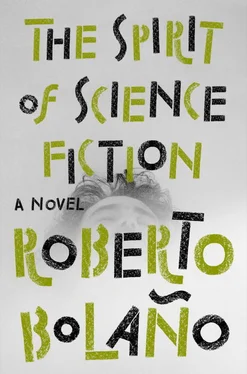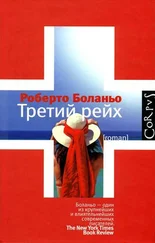Roberto Bolaño
THE SPIRIT OF SCIENCE FICTION
“Do you mind if I interview you?”
“Go ahead, but keep it brief.”
“Do you realize that you’re the youngest writer ever to win this prize?”
“Is that so?”
“I’ve just spoken to one of the organizers. I got the sense that they were moved.”
“I don’t know what to tell you…. It’s an honor…. I’m very happy.”
“It seems everyone is happy. What are you drinking?”
“Tequila.”
“Vodka here. Vodka is a strange drink, isn’t it? It’s not what most women would choose. Vodka neat.”
“I don’t know what women drink.”
“Oh, no? Anyway, it doesn’t matter. A woman’s drink is always secret. Her true drink, I mean. Her infinite pour. But never mind. It’s such a clear night, isn’t it? From here we can see the farthest towns and the most distant stars.”
“That’s an optical illusion, miss. If you look carefully, you’ll observe that the windows are oddly fogged. Go out on the terrace. I believe we’re in the middle of the woods. Practically all we can see are tree branches.”
“Then those are paper stars, of course. But what about the town lights?”
“Phosphorescent sand.”
“You’re so clever. Please, tell me about your work. Yourself and your work.”
“I feel a little nervous, you know? All these people singing and dancing nonstop, I’m not…”
“Don’t you like the party?”
“I think everyone is drunk.”
“They’re the winners and runners-up of all the previous prizes.”
“Good God.”
“They’re celebrating the end of another contest. It’s… natural.”
Ghosts and ghostly days passed through Jan’s mind. I think it was quick, a sigh, and then there was Jan on the floor, sweating and howling in pain. Worth mentioning, too, are the signs he was making, the frozen flurry of gestures, as if to show me that there was something on the ceiling, what? I asked as his index finger rose and fell with exasperating slowness, oh, shit, said Jan, it hurts, rats, mountain-climbing rats, you dumbfuck, and then he said, ah, ah, ah, and I grabbed him by the arms, or I pulled him up, which is when I realized that he wasn’t just sweating rivers but cold rivers. I know I should have run for a doctor, but I got the sense that he didn’t want to be left alone. Or maybe I was afraid to go out. (This was the night I realized that the night is really big.) Actually, from a certain perspective I think Jan didn’t care whether I stayed or left. But he didn’t want a doctor. So I said, don’t die, you’re like the prince from The Idiot. I’d bring you a mirror if we had a mirror, but since we don’t, trust me and try to calm down, don’t die on me. Then, after he had sweated a Norwegian river, he said that the roof of our room was plagued with mutant rats, can’t you hear them? he whispered, my hand was on his forehead, and I said, yes, it was the first time I’d heard rats shrieking on the roof of an eighth-floor room. Ah, said Jan. Poor Posadas, he said. His body was so long and thin that I promised myself that from now on I would do a better job of keeping him fed. Then he seemed to fall asleep, his eyes half closed, his face turned to the wall. I lit a cigarette. Through our only window, the first rays of dawn began to appear. The street below was still dark and deserted, but cars went by with some regularity. Suddenly, behind me, I heard Jan’s snores. I looked at him. He was asleep, naked on his bare mattress, a lock of blond hair drying slowly on his forehead. I slumped against the wall and let myself slide down until I was sitting in a corner. Through the window, I saw an airplane go by: red, green, blue, yellow lights, the kernel of a rainbow. I closed my eyes and thought about the past few days, the big sad scenes, what I could see and touch, and then I got undressed and lay down on my mattress and tried to imagine Jan’s nightmares, and suddenly, before I fell asleep, I was as certain as if it was being dictated to me that Jan had felt many things that night, but not fear.
Dear Alice Sheldon:
I just want to tell you that I admire you deeply…. I’m a devoted reader…. When I had to get rid of my books (I never had a lot, but I had some), I couldn’t bring myself to give away all of yours…. So I still have Up the Walls of the World, and sometimes I recite a little from memory… just for myself…. I’ve read your stories, too, but I gradually lost those, unfortunately…. Here they were published in anthologies and magazines, and some made their way to the city where I live…. There was a guy who loaned me rare stuff…. And I met a science fiction writer…. People say he’s our only science fiction writer, but I don’t believe it…. Remo tells me that his mother met another one, ten or fifteen years ago at least…. His name was González, or that’s how my friend remembers it, and he worked in the records department at Valparaíso Hospital…. He gave money to Remo’s mother and the other girls to buy his novel…. He published it himself with his own money…. González waited outside the bookstore, and Remo’s mother went in and bought the book…. And of course the only books the store sold were the ones bought by the kids from the records department…. Remo remembers their names: Maite, Doña Lucía, Rabanales, Pereira…. But not the title of the book… Martian Invasion … Flight to the Andromeda Nebula … The Secret of the Andes…. I can’t think what it was…. Maybe someday I’ll find a copy…. After I read it, I’ll send it to you as a small token of gratitude for the hours of pleasure you’ve given me…
Yours, Jan Schrella
“Then let’s talk about the winning book.”
“There isn’t much to say. Do you want me to tell you what it’s about?”
“I’d be delighted.”
“It begins in Santa Bárbara, a town near the Andes, in the south of Chile. It’s a horrible place, or at least that’s how I see it, nothing like these charming Mexican villages. But there’s one thing that gives it class: the houses are all built of wood. I have to confess that I’ve never been there, but this is how I imagine it: wooden houses in every shade of brown, unpaved streets, nonexistent sidewalks—or, actually, rickety wooden ramps like in westerns, so that when it rains, mud isn’t tracked inside. It’s in this nightmarish, hellish Santa Bárbara that the story begins. To be precise, it begins at the Potato Academy, a kind of three-story grain shed with an iron weather vane on the roof, probably the bleakest building on Calle Galvarino and one of the many secret faculties of the Unknown University that are scattered around the world.”
“Truly fascinating. Tell me more.”
“On the first floor, there are just two rooms. One of them is so huge that tractors used to be kept there; the other is tiny, tucked away in a corner. In the big room, there are tables, chairs, filing cabinets, even sleeping bags and mattresses. Tacked to the walls are posters and drawings of different kinds of tubers. The small room is empty. It’s a room with a floor, a ceiling, wooden walls—not old wood from when the grain shed was built but new wood, neatly cut and polished, nearly jet-black. I’m not boring you, am I?”
Читать дальше













